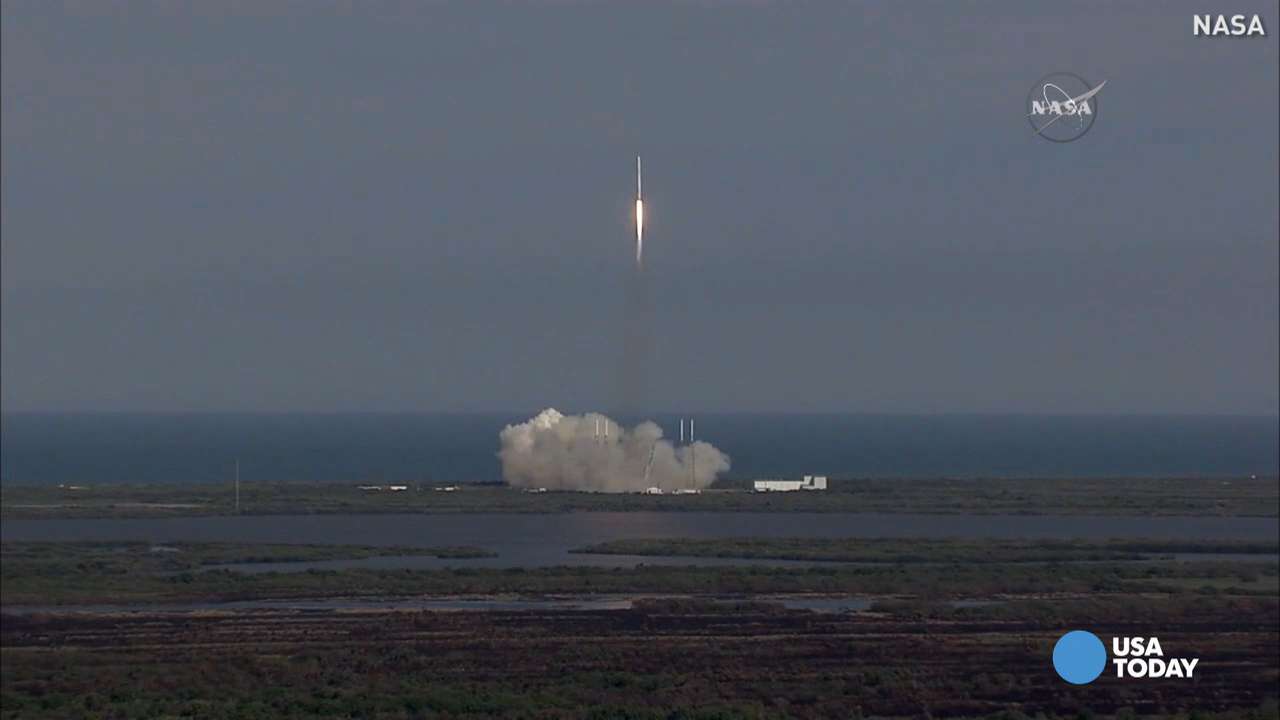Weather pushes SpaceX launch to Friday
CAPE CANAVERAL — Stormy weather has pushed the planned early Thursday launch of a Japanese communications satellite back one day to 1:21 a.m. EDT Friday.
A front bringing severe weather through Central Florida had been expected to clear before the Thursday launch window, with Air Force meteorologists predicting an 80% chance of favorable conditions. No forecast was immediately available for the two-hour launch window at Cape Canaveral Air Force Station's Launch Complex 41.
But that front apparently is not moving as quickly as expected, threatening the launch. The most recent forecast anticipates excellent weather Friday.
The launch of the Japanese satellite continues SpaceX’s work toward a so-far elusive goal: increasing its pace of rocket launches and landings.
The blastoff from Cape Canaveral Air Force Station with the JCSAT-14 satellite will be the company’s fifth Falcon 9 launch since December.
After the launch for Tokyo-based SKY Perfect JSAT, Asia's largest satellite operator with 15 in orbit, SpaceX plans at least two more missions in May and June.
SpaceX started last year at a similar clip, appearing on track to easily surpass its high mark of six successful missions in a calendar year. But a Falcon 9 failure in June derailed that progress, grounding missions for six months.
With several flights by an upgraded rocket now completed, SpaceX believes it could be launching as often as every other week later this year.
“Our launch rate is going to continue to grow,” CEO Elon Musk said after an April 8 launch of International Space Station supplies. “We’re expecting by maybe the third or fourth quarter (of 2016) that we’d be doing a launch every two to three weeks.”
With more than 70 missions under contract worth more than $10 billion, SpaceX must launch more frequently and consistently to satisfy its customers and challenge competitors.
In addition to the failure last summer, SpaceX attributes some of its slow pace to a series of improvements made to the Falcon 9, now on its third version since debuting in 2010.
“When you phase an upgrade in, you need a little bit of time between the launches, and then after a while you pick up the pace,” said Hans Koenigsmann, vice president for flight reliability, before last month’s flight. “The time between the missions will get shorter and shorter.”
Supporting that goal, SpaceX plans to activate a second Florida launch pad later this year, after finishing renovations to pad 39A at Kennedy Space Center.
Each Falcon 9 launch also presents another opportunity to try an experimental landing of the rocket’s first stage, either on land or an unpiloted ship floating down range in the ocean.
Two successful landings so far — one on a pad at Cape Canaveral in December, the other on a "drone ship" last month — have shown SpaceX can recover and potentially reuse big rockets, which Musk considers essential to making spaceflight more affordable and ultimately enabling human missions to Mars.
But SpaceX says sticking another successful landing at sea about 10 minutes after liftoff Thursday is "unlikely.”
Compared to last month’s space station resupply mission, this rocket will fly faster and endure more searing heating during its return from space while boosting JCSAT-14 to a much higher orbit — on its way to a perch 22,300 miles over the equator.

“It’s going to come in really hot,” Musk said of a Falcon 9 booster during such high-orbit missions. “It wants to melt.”
More sea landings are key to achieving the company's dream of low-cost rocket reusability, since roughly half of SpaceX’s launches cannot return to land.
The mission Thursday is the first of two SpaceX is under contract to launch for SKY Perfect JSAT, to be followed by JCSAT-16 later this year.
Built by Palo Alto, Calif.-based Space Systems Loral and worth more than $100 million, the JCSAT-14 spacecraft is expected to provide TV and Internet service for at least 15 years across parts of Asia, Russia, Australia and the Pacific Islands. It will join and then replace a satellite launched in 2002.
Follow James Dean on Twitter: @flatoday_jdean
Launch details
Mission: JCSAT-14 communications satellite for SKY Perfect JSAT
Rocket: SpaceX Falcon 9
Launch time: 1:21 a.m. EDT Friday
Launch window: Two hours, to 3:21 a.m. EDT Friday
Launch complex: 40 at Cape Canaveral Air Force Station